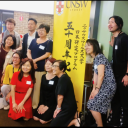第104回「花見」って何?
What is hanami?
日本人には常識でも、文化の違うオージーにはイマイチ伝えづらい…。
そんな時にぴったりの表現や話の流れをご紹介。
文:池田俊一 オーストラリア国立大学アジア・太平洋カレッジ日本センター、協力:池田澪奈
「友達が『今年はコロナ禍で花見ができそうにもないな……』と言っていたけれど、これってどういう意味?」
Aussie: A lot of events are still being called off due to COVID-19, but what is 花見(hanami)?
Aussie: Oh! I’ve seen it on a Japanese documentary before, back in my country. It’s a March / April thing isn’t it?
You: That’s right . The cherry blossoms across the nation don’t all bloom at the same time of course, because the climate between each of the regions can differ quite a lot. But usually, they begin to bloom between late March to mid-April – right about now, actually, as we head towards spring.
Aussie: Do you do other things apart from viewing the flowers for 花見?
You: Yes. People can also enjoy specially prepared dishes and sake [rice wine], along with music, dancing and other seasonal festivities, depending on the local 花見 event organised. But like your friend said to you, I don’t think any large-scale 花見 events would be allowed due to COVID-19 restrictions, this year…
Aussie: It’s a shame… But maybe small-scale ones could be held, adhering to appropriate social distancing measures, of course.
You: True. Although, no matter what kind of strict rules are set in place, if the majority of people don’t follow the guidelines, then there is no point.
Aussie: I completely agree. Maybe something like a booking system needs to be put in place, so that the organisers can control the number of people attending, to some extent.
You: I don’t think that’s a bad idea at all. It would be easier for contact tracing too, should there be the need for that post-event, as the organisers would have everyone’s details.
Aussie: I know that some people don’t like giving out their personal details ‘unnecessarily’, but I think that – especially with the way the world is going to be for a little while longer – we all have to play our part in doing what’s best for the safety of the whole community.
説明する時のポイント
「花見」は、歴史上の文献によると奈良時代(8世紀)の貴族の梅を愛でる行事が起源と言われているが、平安時代に桜の行事に代わり、それ以降「花見」の花は主に桜を指す言葉として現代まで続いている、と教えてあげよう。特に長い間、戦争がなかった江戸時代に、貴族や武士だけではなく、庶民が満開の桜の木の下で飲食を楽しみながら、春の訪れを祝うことが習慣になった、と付け加えておこう。日本は小さい国ながら、同じ時期でも沖縄から北海道までかなり温度差があるだけではなく、桜の種類によっても開花時期が違うので、全国で一斉に「花見」をするわけではなく、地方によって異なることも知っておいてもらおう。また、昼間のみならず、夜も「夜桜見物」という「花見」の楽しみ方があることも伝えておきたい。今年は、コロナ禍のため、大勢の人が集まるような「花見」は無理だろうが……。
【単語・成句】
called off 中止になる
date back 歴史を遡る
across the nation 全国
differ 異なる/違う
head towards ~ ~に向かう
along with ~ ~と共に
seasonal festivities 季節にふさわしい行事
adhering to ~ ~を守って
social distancing measures 社会的距離の決まり
no matter what ~ どんな~でも
set in place 定める/施行する
there is no point 意味がない
put in place 導入する/決める
to some extent ある程度まで
contact tracing 感染病接触者追跡
should there be ~ もし~があるなら
post-event 催し物後
give out 公表する
play our part 自分たちの役割を果たす
【会話文で使える表現】
“It’s a shame.” という表現は、「残念だ」「気の毒だ」という気持ちを伝えたい時に使われる。
【例1】”I hear that all Uni classes are still being held online.” “It’s a shame – students are not getting the whole Uni experience.”
「大学の授業はまだ全てオンラインだそうだ」「気の毒だね。大学生活の全てを経験できないなんて」
【例2】”Looks like the weekend event’s been cancelled due to the rain.” “What a shame. I was looking forward to it.”
「週末のイベントは、雨のせいで中止になったみたい」「残念、楽しみにしていたのに」
【例3】”It’s a shame I still can’t travel to Japan.” “I know, I wonder when the border restrictions will be lifted.”
「日本旅行がまだできないのが残念だ」「ね、いつになったら入国制限が解除されるんだろう」












You: 花見 literally means “flower viewing”, and it’s a custom that dates back many centuries, where people come together to have picnics underneath the blossoming cherry trees.